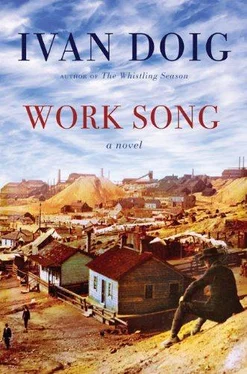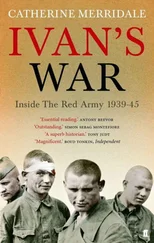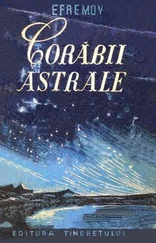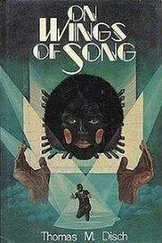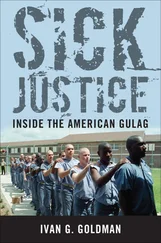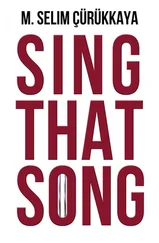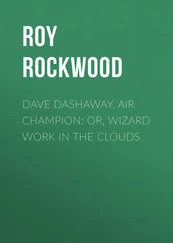By now the band had wheeled about and strutted back, facing the mineworkers. The resplendent bandleader lifted his arms and everything halted. He bowed from the waist toward the council, and a great cheer went up for the union and the restored wage. The other council members pushed Jared, grinning and not objecting too much, out for recognition by himself. The bandleader spun, up went the arms, and in tribute the band thundered into the mighty Welsh anthem “Men of Harlech.”
Men of Harlech, march to glory!
Victory is hov’ring o’er ye!
Bright-eyed freedom stands before ye-
Hear ye not her call?
“I’ve never been within five thousand miles of Wales,” Grace was sniffling when it was over, “and that old thing always makes me want to bawl.”
I was somewhat misty myself. “A very wise man once said mankind’s two great magics are words and music.”
Meanwhile Jared had doffed his hat to the band and the crowd, and the marchers were starting to shuffle into motion again.
Then it happened.
From somewhere, perhaps an alley or a rooftop, came a lone singing voice, just short of a yodel but with a devilish lilt to it. The refrain sliced through the parade mood:
Wear the copper collar,
Swallow dirt for your dollar.
You’ll get pie in the sky
When you die.
Jared looked up as if the mocking ditty had hit him like an arrow. A squad of policemen at the intersection, whom I had assumed were on hand to hold back the crowd, jumped into action toward where the derisive singing seemed to come from. Before they made much headway, the invisible songster was at it again.
Work and pray,
Live on hay.
You’ll get pie in the sky
When you die.
Now a couple of the council members shouted to the bandleader, a march tune was struck up, and the parade slowly snaked into motion once again. Looking back from now, what strikes me in the whole episode was that although I had never heard the pie-in-the-sky stanza before, I knew its origin almost from the first few insidiously catchy notes. So did Jared, according to his reaction. That kind of serenade rose straight from the Little Red Songbook.
“That’s Butte for you.” Grace had been waiting as patiently as she could for me to return to myself. “The top of the world one minute, the glory hole the next.”
NOW IT WAS her turn to surprise. With the parade over, I assumed we would follow the crowd to the next attraction, down at the depot. Butte was a regular stop for political speakers traveling through, in that ritual of a suspender-bursting oration from the rear platform of a train. Today’s portable statesman was the imported variety, Eamon de Valera, a leader in Ireland’s struggle against British rule, and judging by the sprigs of green in lapels and bonnets of everyone rushing by us, Dublin Gulch was avalanching off the Hill to hear him. Grace, though, firmly headed us the other direction. She would not tell me our destination-“You know what curiosity did to the cat, don’t you?”-as we bundled onto a trolley. All I saw ahead as the trolley tracks continued past the outskirts of the city were mine dumps and the wall of mountains that topped out at the Continental Divide. Yet Grace and the other holiday-goers packed in with us were as merry as if we were bound for paradise.
The last stop on the line, in the tuck of a valley at the foot of the mountains, may not have been my notion of paradise, but it was somebody’s idea of a fantasy land. We stepped off into an enormous amusement park, with COLUMBIA GARDENS spelled out in floral design against an entire hillside. Everything but the flowers seemed to be in excited motion. As I tried to take it all in, a roller coaster galloped through the treetops, and beyond, a Ferris wheel spun against the sky. Across acres and acres of the only green grass I had seen since coming to Butte, there were picnic groves; a playground featuring a brilliantly striped maypole and high-flying swings and a labyrinth of monkey bars; a merry-go-round; a zoo; a baseball diamond; a boxing ring; a trout pond; flower gardens; on and on. And the populace of the city had arrived in force to absorb the pleasures, it looked like. There is an unforgettable painting by Bruegel of swarms of children, serious about their fun, each bunch engaged in a different game and oblivious to the larger world. This panorama was like that.
Directly ahead from where Grace and I stood was a huge central pavilion, vaguely Italianate, surrounded by a soda parlor and other refreshment stands. “Pinch me,” I told her, “I seem to have been whisked off to Coney Island. Who runs this?” She only gave me a certain kind of look.
“Don’t tell me,” I groaned. “The Anaconda Company.”
“You’re getting better at the facts of life,” she awarded me.
The extravaganza surrounding us, then, was the other side of the copper coin, at least for this one day. Shaking my head at the turnabout of Anaconda’s conduct, I asked Grace what she would like to do first. “Stroll the gardens,” she chose without hesitation. “I haven’t had an outing like this since-it’s been a few years.”
For as long as there are men and women, some things in life will best be done arm in arm, and strolling a flower garden is one. We exclaimed together at a hillside burst of blooms planted in the design of a giant lyre, as if a Gulliver had temporarily laid aside his music-making. Grace’s grip on my arm was an exclamation in itself as we happily competed in naming off blossoms while we walked. Under the spell of the aromatic surroundings, we soon were sharing more than just the pleasure of the day. Grace’s story was entirely rooted in Butte, I learned. “The mapmakers don’t get rich on some of us, Morrie.” To help support the family she had been a bucket girl, selling sandwich lunches from a pail as the men trooped to the mines on the Hill. There she caught the eye of a young miner on the same shift with her father; Arthur Faraday, as patient as he was gallant, had his reward when she reached marriageable age. The toils of Butte took her parents before their time-heart and lungs worked to death-leaving the young couple the gift of property. I listened raptly, the makings of a life always casting a spell on me. “We thought we had it made, Arthur and I, with the house in our name and his job in the Speculator.” Instead, the fire, the worst in American mining history, widowed her overnight. There had been no children. “Nature did not provide.” Left on her own, Grace used what resource she had-the house-and boarders such as present company were the result. “You and the matched pair are good about the rent,” she patted my arm, “but it’s still a hard go. The taxes and the upkeep and all. I get by, though. No sense in waiting for my ship to come in when there’s none in sight, I’ve decided.” She tilted her head in my direction, putting the question lightly enough. “What about yours, is the library it? You seem at home there.” I cocked the same kind of look to her. “Do I? I don’t always have the Butte Public Library all to myself, understand.”
We laughed, duly self-conscious about the day’s unexpected glimpses into each other. So much private time on the most public day of the year surely was too good to last. “Aren’t Hoop and Griff joining us?” I checked. “It’s not like them to miss this kind of spree.”
“They’re off to their own pursuits, they told me,” Grace reported in that tone of fond exasperation the pair customarily produced in her. All at once she clutched my arm hard enough to leave a mark. “Look, dear!”
Companionable as our promenade was, I was surprised silly by the sudden endearment. I had to wonder if I was keeping up with developments. Was this a forward side of Grace Faraday, hitherto hidden in the house rules of landlady and boarder? Then, thoroughly abashed, I saw the deer she meant, several does and fawns flitting through a stand of blue spruce in the near distance.
Читать дальше
